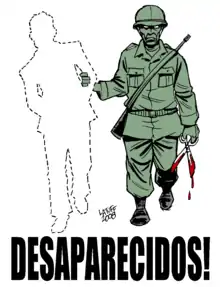Raymundo Gleyzer
Raymundo Gleyzer (September 25, 1941, Buenos Aires - missing since May 27, 1976) was an Argentine political filmmaker. He specialized in documentaries. He was disappeared as an opponent of the military dictatorship, and most likely murdered.

Born into a Jewish family, Gleyzer became interested in politics and film early on. All his films he put into the service of the fight against social injustice and for the revolution.
He made his first film in the backward northeast of Brazil, where he barely escaped imminent death. In the early 1970s he made a film in Mexico about the so-called "institutionalized revolution" of the PRI ruling party. The film was banned in Argentina at first, but found a lively echo in Mexico among the students. In 1973 he co-founded the Cine de la Base group, which organized demonstrations and discussions with workers (i.e. outside the cinema industry).
His last major film, Los traidores (The Traitors), presents his critique of the Peronist political movement, which played an important role in Argentina in 1973. The film depicts how union leaders have allied themselves with entrepreneurs, the military and the US to maintain their personal power and enrich themselves.
On May 27, 1976, Gleyzer was abducted and tortured, by a death squad of the military government that had come to power two months earlier, and never seen again. He is thus one of the tens of thousands of "desaparecidos" (disappeared) of the Argentine military dictatorship, most of which were secretly murdered. Brazilian cartoonist Carlos Latuff created a cartoon dedicated to Gleyzer and the violently "disappeared" people of Latin America.
Films
- 1964: La tierra quema (The Land Burns) Documentary short
- 1965: Ceramiqueros de tras la sierra (Ceramic workers behind the saw)
- 1966: Occurido en hualfin (It Happened in Hualfin) (Gleyzer as the screenwriter) Documentary
- 1966: Nuestras islas Malvinas (Our Malvinas Islands) Documentary short
- 1969: Elinda del Valle (Elinda of the Valley) Documentary short
- 1971: Swift 1971 Documentary
- 1971: México, la revolución congelada (Mexico: The Frozen Revolution) Documentary
- 1972: Ni olvido ni perdón: 1972, la masacre de Trelew (Neither Forgotten nor Pardoned: 1972 the Trelew Massacre) Documentary short
- 1973: Los traidores (The Traitors). 16 mm, color. First presented on July 1, 1973, International Forum of Youth Films, Berlin.
- 1975: Me matan si no trabajo y si trabajo me matan: La huelga obrera en la fábrica INSUD (They kill me if I don't work, and if I work they kill me: the workers strike of the INSUD factory)
Literature
- Fernando Pena, Carlos Vallina: El Cine quema – Raymundo Gleyzer. Ediciones de la Flo, Buenos Aires 2000. ISBN 9505152477
- Adela, Pineda Franco: “El latinoamericanismo de Raymundo Gleyzer en México, la revolución congelada.” Vivomatografías: Revista de estudios sobre precine y cine silente en Latinoamérica, no. 2, pp. 99-123, 2016.
- Adela Pineda Franco: Chapter 4. The Mexican Revolution on the World Stage: Intellectuals and Film in the Twentieth Century. SUNY Press, 2019.
- Verleihkataloge der "Freunde der Deutschen Kinemathek e.V." 1970: Occurido en Hualfin. 1972/73: (neu) Mexico – La revolucion congelada. 1973/74: (neu) Los Traidores (Die Verräter).
- Informationsblatt des Nummer 32, "Internationales Forum des Jungen Films", Berlin, 24. Juni – 1. Juli 1973; Redaktion: Peter B. Schumann
External links
- Sitio oficial filmraymundo.com.ar
- Raymundo Gleyzer at IMDb
- Sobre la obra (español)
- Documental sobre Raymundo Gleyzer (español)
- Sobre su desaparición (español)
- Raymundo
- Raymundo: el documental
- Nuestras Islas Malvinas (1966)